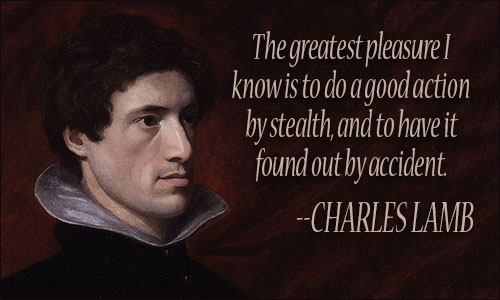CHARLES LAMB QUOTES
English essayist and critic (1775-1834)

Your borrowers of books--those mutilators of collections, spoilers of the symmetry of shelves, and creators of odd volumes.
CHARLES LAMB
"The Two Races of Men", Essays of Elia
There is a pleasure in affecting affectation.
CHARLES LAMB
"Table Talk", Works: Essays and Sketches
The vices of some men are magnificent.
CHARLES LAMB
"Table-Talk and Fragments of Criticism", The Life and Works of Charles Lamb
Books of quick interest, that hurry on for incidents are for the eye to glide over only. It will not do to read them out. I could never listen to even the better kind of modern novels without extreme irksomeness.
CHARLES LAMB
"On Books and Reading", The Last Essays of Elia
Newspapers always excite curiosity. No one ever lays one down without a feeling of disappointment.
CHARLES LAMB
"On Books and Reading", The Last Essays of Elia
No woman dresses below herself from mere caprice.
CHARLES LAMB
attributed, Day's Collacon
For I hate, yet love thee, so,
That, whichever thing I show,
The plain truth will seem to be
A constrained hyperbole,
And the passion to proceed
More from a mistress than a weed.
CHARLES LAMB
"A Farewell to Tobacco"
A man can never have too much Time to himself, nor too little to do. Had I a little son, I would christen him Nothing-To-Do; he should do nothing. Man, I verily believe, is out of his element as long as he is operative. I am altogether for the life contemplative.
CHARLES LAMB
"The Superannuated Man", Last Essays of Elia
Credulity is the man's weakness, but the child's strength.
CHARLES LAMB
"Witches and Other Night Fears", Essays of Elia
My theory is to enjoy life, but the practice is against it.
CHARLES LAMB
letter to William Wordsworth, Mar. 20, 1822
He has left off reading altogether, to the great improvement of his originality.
CHARLES LAMB
Essays of Elia
The going away of friends does not make the remainder more precious. It takes so much from them as there was a common link. A. B. and C. make a party. A. dies. B. not only loses A. but all A.'s part in C. C. loses A.'s part in B., and so the alphabet sickens by subtraction of interchangeables.
CHARLES LAMB
letter to William Wordsworth, Mar. 20, 1822
Men marry for fortune, and sometimes to please their fancy; but, much oftener than is suspected, they consider what the world will say of it--how such a woman in their friends' eyes will look at the head of a table. Hence we see so many insipid beauties made wives of, that could not have struck the particular fancy of any man that had any fancy at all.
CHARLES LAMB
"Table-Talk and Fragments of Criticism", The Life and Works of Charles Lamb
A laxity pervades the popular use of words.
CHARLES LAMB
"Table-Talk and Fragments of Criticism", The Life and Works of Charles Lamb
Begin a reformation, and custom will make it easy. But what if the beginning be dreadful, the first steps not like climbing a mountain, but going through fire? What if the whole system must undergo a change violent as that which we conceive of the mutation of form in some insects? What if a process comparable to flaying alive be to be gone through? Is the weakness that sinks under such struggles to be confounded with the pertinacity which clings to other vices, which have induced no constitutional necessity, no engagement of the whole victim, body and soul?
CHARLES LAMB
"Confessions of a Drunkard", The Last Essays of Elia
A number of moralists condemn lotteries and refuse to see anything noble in the passion of the ordinary gambler. They judge gambling as some atheists judge religion, by its excesses.
CHARLES LAMB
Essays of Elia
Time partially reconciles us to anything. I gradually became content--doggedly contented, as wild animals in cages.
CHARLES LAMB
"The Superannuated Man", Elia and The last essays of Elia
It is with some violation of the imagination that we conceive of an actor belonging to the relations of private life, so closely do we identify these persons in our mind with the characters which they assume upon the stage.
CHARLES LAMB
attributed, Day's Collacon
In some respects the better a book is, the less it demands from binding.
CHARLES LAMB
"On Books and Reading", The Last Essays of Elia
I love to lose myself in other men's minds.
CHARLES LAMB
"Detached Thoughts on Books and Reading", Last Essays of Elia